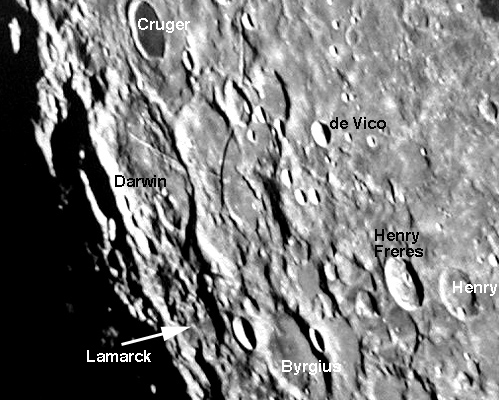February 12, 2009
Happy 200th, Darwin!

Consolidated Lunar Atlas plate F24
This LPOD originally appeared Feb 12, 2004, celebrating Darwin's 195th birthday.
Charles Darwin, who ranks with Newton and Einstein as one of the world's greatest scientists, was born on this date 200 years ago at Shrewsbury, England. Unlike Darwin's ideas, which remain robust, the lunar crater Darwin has seen better days. Darwin is the left of center crater cut by a diagonal rille and containing an off-center coarse dome. Although the 130 km wide crater is battered, it is easy to find near the western limb, being just south of the dark, mare-floored crater Cruger. Ironically, the crater Darwin was instantaneously aged by the formation of the Orientale basin, just over the limb. Lunar Orbiter IV images show that this entire region is mantled in deep and contorted, ground-hugging ejecta from the Orientale impact. The roughness visible in the upper right interior of Darwin is crumpled surface-flow ejecta that was decelerated by collision with Darwin's east wall. Lamarck, the crater south of Darwin, is also full of confused masses of ejecta. The visible rille in Darwin crosses it's east rim and makes an X where crossing a more northerly trending rille in the adjacent unnamed crater. The dome inside Darwin is large and rough-textured; it is also one of the few domes not on mare material. Finally, note the large crater at the bottom center. This is Byrgius, with nearly twin craters cutting its east and west rims. And on the floor of Byrgius - is that a smaller, flatter, pitted dome?
Chuck Wood
And Happy 200th to Abraham Lincoln!
Technical Details
Extract from Consolidated Lunar Atlas photographic print F24, originally acquired with Univ. of Arizona Lunar and Planetary Lab 61" Catalina reflector, Feb 22, 1967.
Related Links
Rükl plate 50
Yesterday's LPOD: Jumbilation
Tomorrow's LPOD: Beyond the Polar Explorers
COMMENTS?
Register, Log in, and join in the comments.



